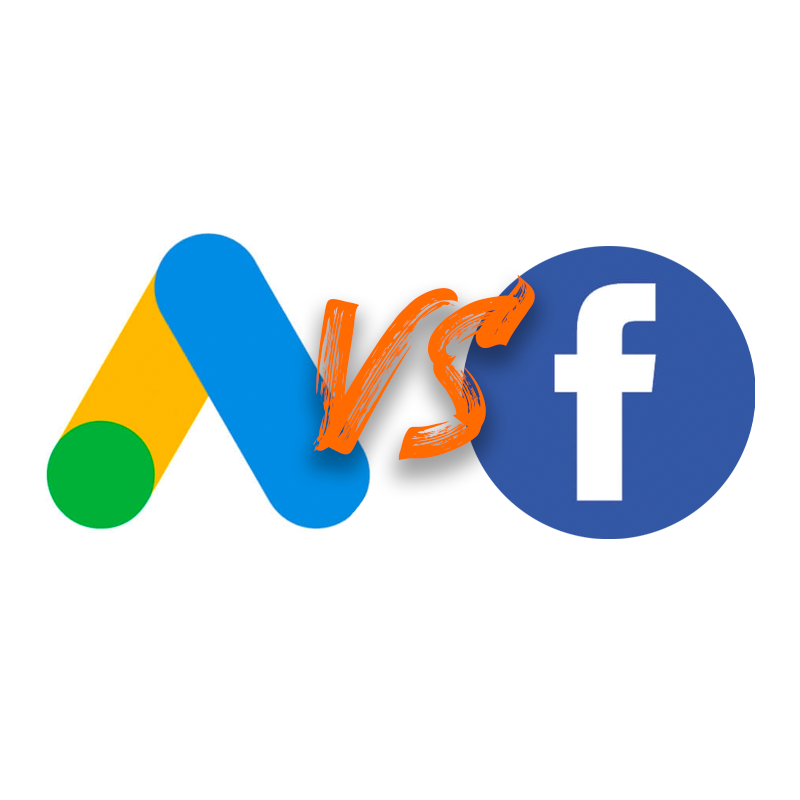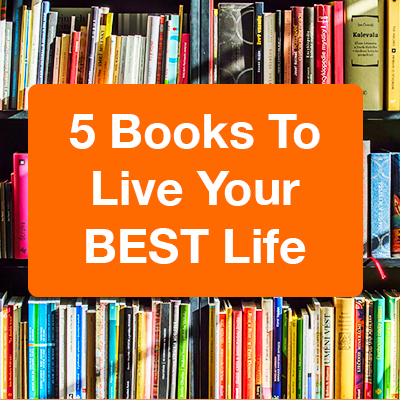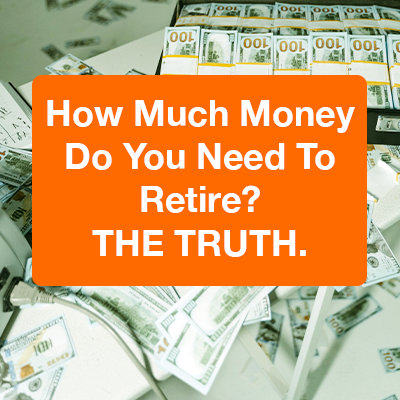In this article, I review 2 of the biggest advertising platforms out there. Google ads vs Facebook ads.
Choosing the right advertising platform is useful because it’s the difference between making a lot of money in your business vs. losing money and going out of business.
Let’s dive right into it.
Table Of Contents
Metric Clarity
This category just talks about how useful each of the displayed metrics are on Facebook vs Google ads.
Facebook:
- The metrics aren’t very clear. Other than cost-per-purchase, you’ve got all these weird synonymous terminology like “outbound clicks” vs “page views” vs “landing page views.” I’ve used Facebook ads for years and it’s still unclear to me what a lot of these metrics mean, and why they need 3 different metrics to say roughly the same thing.
- At the end of the day, as an advertiser I really only care about 2 main things: 1) How much it costs for them to click on my website, and 2) how much it takes to get a purchase.
- Facebook audiences: they tell you how big an audience is, which is great because you know you’re not advertising to air. But Facebook doesn’t really ever tell you anything about how engaged the audience would be, or offer any insight on how likely some interest audience is likely to buy your product. So not sure what the point is.
- Example: Someone that likes “cats” doesn’t mean that they like pet food for cats.
- There’s a lot of useless vanity metrics that I perceive to be just noise. For example, 3-second video views, or “engagement” and stuff like that which ultimately won’t matter for the bottom line of a small business.
Google:
- Metrics are clear.
- Has “cost per conversion,” and “cost per click” which are really the 2 metrics I care about.
- “What about stuff like cost per add-to-cart, or initiating checkout?” Shopify analytics already tells me the percentage of people that drop off at each stage of the funnel, so redundant metrics on the Google Ads dashboard won’t make a difference.
- The most useful metric Google has is they’ll show you how many searches a month there is for a particular keyword. This metric provides absolute clarity because you’ll understand what the market’s searching for and which exact keywords you should be optimizing for.
- Example: Someone searching for “pet food for cats” is likely wanting to buy cat food.
At the end of the day, you’re already overwhelmed enough running a business: looking at your ad dashboard shouldn’t be another thing to stress you out.
For this reason, Google takes the win for having transparent metrics and for an overall lack of clutter.
Round 2 Of Google Ads Vs Facebook Ads: Overall Value
This category just talks about which one’s better to spend money on, in general.
There are some exceptions to what I’m about to illustrate below, but not a lot.
Facebook:
- Platform targets cold audience primarily, which means your ad needs to do most of the heavy-lifting instead of their AI.
- Has decent retargeting so I can have past visitors be reminded of our product when they browse Facebook. This is the only feature I use nowadays for maximum value.
- Facebook has a lot of interest audiences to pick from. This isn’t a good thing. This just means that it’s very easy for an algorithm to overfit to a very tiny audience, or just not find anyone good at all.
- Gurus trying to sell you a Facebook course will tell you Facebook AI is awesome. It’s not though, compared to Google. Google’s world-renowned for their AI (think AlphaZero). Facebook isn’t really known for anything except for Zuckerberg copying TikTok and Snapchat.
- Since Facbook’s AI sucks, you’ll get very inconsistent results. It’s hard to build a business around inconsistent results. The Facebook Ads + dropshipping model doesn’t work and is one of the main reasons why I advocate against dropshipping.
Google:
- Google AdWords/Shopping will target people searching for what you’re trying to sell already. This means the AI will do most of the heavy-lifting instead of your ads.
- Has retargeting built into their Smart Shopping. This means you don’t have to do anything to retarget your audience. On Facebook, you need to set up a whole campaign to do the same thing.
- Google’s ad AI is far superior to Facebook’s AI.
Due to Google’s massive AI advantage over Facebook, and the fact that Google ads target warm audiences while Facebook ads target stone-cold ones, Google takes the win on overall value. In other words, you’re most likely to maximize your return on ad spend with Google as opposed to Facebook.
Ad Platform Policy
This category just talks about how friendly the advertising platform is to their advertisers.
Facebook:
- Clear and transparent policies. Their policies are very specific and straightforward, and they even show a ton of examples of what you should do vs. what you shouldn’t do.
- As long as you follow their policies, it’s very easy to appeal your account successfully in my experience.
Google:
- Their rules are designed to be vague “so it can’t be gamed.”
- During the 2020 elections, all my friends + myself got our accounts suspended on Google. This is terrible. The suspension message just said “misrepresentation” without any indication of what we did wrong. Google’s support team was just a bunch of virtual assistants with broken English that copy/paste vague responses, showing you exactly just how much they don’t care even if the business was your sole source of income.
- No forum-searching, YouTube video, nor search engine result could pinpoint what ‘misrepresentation’ meant and as a result most of my friends wasn’t able to reinstate their account successfully.
Both Google and Facebook don’t care about your business. The difference is, Google will laugh at you while they cause you to go bankrupt, while Facebook will just reinstate you since it’s lower effort.
Google Ads Cost Vs Facebook Ads Cost
This category analyzes the 2 platform’s cost structure.
Facebook:
- Charges you for clicks. And also impressions (number of people they show your ad to).
- Facebook has no skin in the game. This is bad. They’ll get money from you whether or not your ad performs well, and as such they’re not incentivized to improve their crappy AI.
- Post-COVID, their CPM has skyrocketed. This means just showing your ad and getting 0 clicks is very expensive.
- Ridiculous increases in CPM over time means Facebook ads will never be a sustainable media buying platform. What’ll work for you this year could make you bankrupt next year due to insane price increases.
- Some studies say that Facebook’s average cost-per-click is lower than Google’s. But due to their bad AI and the fact that you’re advertising to a cold audience, your overall ROAS will be lower.
- Lastly, they’ll charge you your full budget the first day. On a large budget, it isn’t even feasible for an AI to learn that fast. As a result, you’re just paying Facebook a lot of money for no results. They’ll show your ad to anyone and everyone even when it’s the wrong audience because you get charged for impressions.
- Their cost is purely CPC-based. Other words: if nobody clicks on your ad, you won’t get charged a dime.
- This means they have skin in the game, and their objectives are aligned with yours.
- Google Ad CPC has increased over time, but only gradually. Gradual increases suck, but at least it’s hedged against inflation and it gives you more time to adapt. Compare this to Facebook rapid increases of CPM from $20 to $60 in one year.
- Example for a store of mine: Cost per click for a Facebook retargeting ad is $0.88 average. And a recent cold ad ran on Facebook cost $4.66 per landing page view. Google cost $0.34 per click. Yep, Google’s “cold” ads to an audience is half as much as the retargeting ads on Facebook.
- Google’s AI is actually useful, and will seek to lower your CPC over time. This means the longer you run an ad, the cheaper it’ll be, generally speaking.
- Ads get fatigued on Facebook, which means people will be tired of your ad after seeing it a few times. As a result, the opposite is true for Facebook: the longer you run an ad, the more expensive it’ll be.
- You’re running ads against a warm audience, so your ROAS will outperform Facebook.
- Google generally takes a few days, up to 2 weeks, before they actually charge you your daily ad budget. This means their AI is actually “picking its shots” and slowly learning, as opposed to trying to blow your (money) wad from day one.
Clear winner for your wallet is Google.
Google Ads vs Facebook Ads’ Simplicity
I like things simple because I’m dumb. This category looks at how hard it is to use each platform.
Facebook:
- Tons of features. Most of them are not as useful as they market it to be.
- They’ve got stuff like lookalike audiences, audience insights, and a plethora of other tools. They look good and sound like they should work in the abstract. In practice, they’re a placebo.
- In any niche you want to market to, there’s a ton of interest audiences to pick from. This seems like a good thing but it’s the paradox of choice. Less is more here. An overwhelming of audiences to pick from means you’re less likely to pick the most optimal one to target.
- In post-iOS14, installing a pixel has become even more complicated than before. You now have to go through a multistep process to verify your website as well.
- Extremely hard learning curve because it has a ton of features. Like, too many features. Like, so many features that it’s very unlikely you’ll ever pick the most optimal combo to use.
- When your Facebook campaign isn’t working, it’s very hard to know exactly what to improve on. Is it your website? Your ad’s photo or video? The ad’s text? Nobody knows! It’s just a guessing game and a business can’t be run on guessing games.
- The very complicated, but ineffective nature of Facebook ads is equivalent to the day-trader looking at 50 technical signals, only to get a subpar return when compared to the S&P 500.
Google:
- There’s search ads, shopping ads, and smart shopping ads (basically same as shopping ads, but even less work).
- They’ve also got features for YouTube ads and things of that nature, but I mostly focus on search engine ads.
- Your “audiences” to pick from is not overwhelming. There’s only a very finite amount of great keywords that you’d rationally optimize for anyway.
- Very easy learning curve. You don’t have to throw up a fancy photo or video like you would on Facebook just to run an ad. All you need to do is type some text for the headline and description, and voila, you can publish a search ad. And if you’re going to do a shopping ad, you need to have a picture…but the picture defaults to your product page’s first image anyway, so it’s not like you need to do any extra work to create a photo for your ad.
- The simplicity in Google ads lies in its ease of iteration. When something isn’t working, it’s very clear on how you could improve your campaigns. Just exclude irrelevant keywords people are searching for and the campaign will get better over time.
- The simplicity, yet effective Google ads is equivalent to a long-term investor that bought $AAPL at $15 and now they’re super rich by doing nothing.
Google ads vs Facebook ads simplicity winner, and clear overall winner: Google.
Should You Avoid Facebook Ads Entirely? Yes, And No
Facebook ads is a bad platform. It was very effective in 2015-2017. Too bad we’re not even in the same decade anymore.
On Facebook, you have to spend an order of magnitude more effort than Google to even get an ad running. And even if you get a Facebook ad running, your ROAS will be much worse than if you went with Google.
Google is the definition of the 80/20 rule: you’ll get 80% of the results with Google with only 20% of the effort. Facebook is opposite: you’ll do 80% of your effort there and get only 20% of results.
Due to Google’s main weakness, which is they’ll ban you at any time, my recommendation is this: diversify with other platforms. Use your main platform with Google, and then use Facebook to retarget your visitors from Google. Then, experiment with newer and less-competitive platforms like Bing, TikTok, and Pinterest.
PS: Buying books I allude to here will give me money to run this website.












0 Comments
Trackbacks/Pingbacks